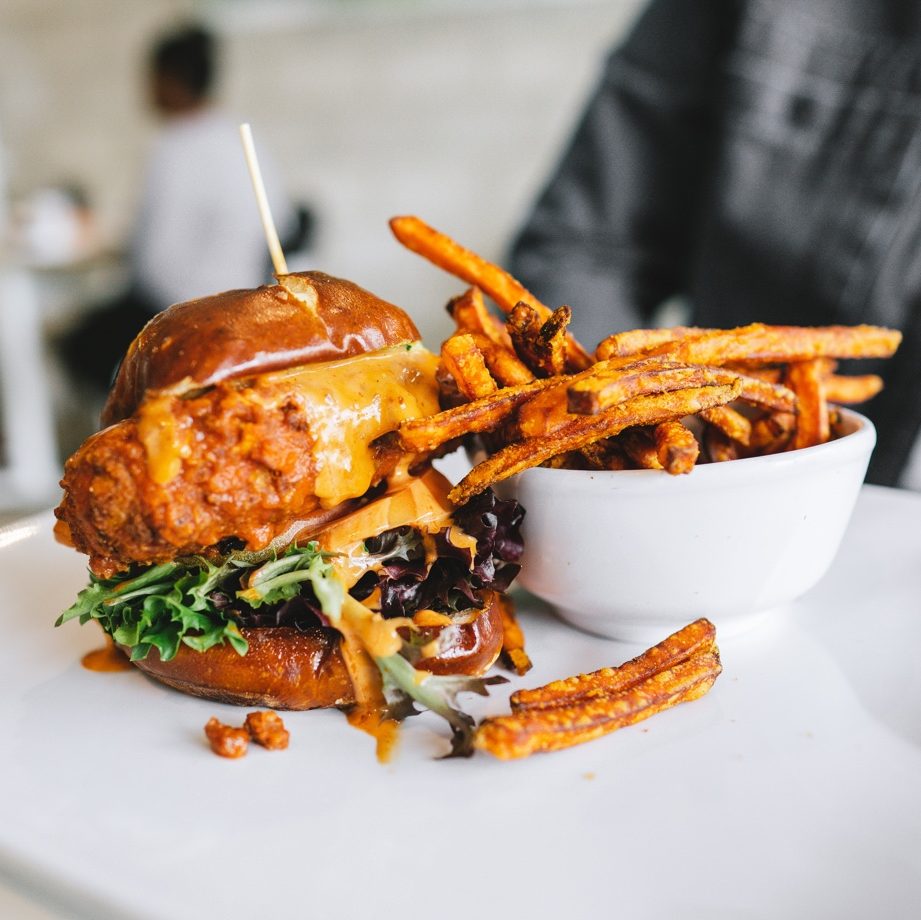We recently caught up with Todd Anderson to find out what fueled his meat-free journey, how his passion evolved into content creation and restaurant ownership, and the connections between Black history and plant-based eating.
Todd Anderson isn’t your typical vegan — and that’s the point. The content creator and co-owner of San Diego’s Spoiled Vegans Cafe loves getting creative in the kitchen, crafting plant-based dishes that are approachable and catch the attention of both vegans and the not-yet-converted.
His Instagram is a crave-worthy collection of videos showcasing chicken sandwiches, burgers on pretzel buns, creamy nacho cheese sauce, and air-fried cheese sticks (all of it vegan, of course). If your mouth is watering — that’s the point. His strategy is simple: Create animal-free versions of people’s favorite meals.
Editor’s note: This interview has been edited for length and clarity.
SG: Tell me about how your journey with veganism began.
TA: In 2016, I went to Las Vegas with a good friend of mine. We had a blast. We probably had the best time of our lives. I came back to San Diego from that trip, and I had a hangover that lasted two days. And on the second day, I woke up and I was like, something’s wrong. This is bigger than just a hangover. … I went onto Netflix. Netflix is the king, queen, whatever you want to call it of documentaries, so I stumbled on one called Food Choices. I was like alright, this has a lot to do with making better decisions of what food I eat.
There was one doctor in the documentary that said one sentence that changed my life. It was that we’re the only species that drinks milk from another species. That sentence connected with me, and I sat there for a few seconds, and I was like man, that’s strange. That’s weird. Like, that’s very weird that we’re an intelligent species, and we’re the only species that drinks milk from another species.
So that was my connection. I watched the rest of the documentary, and at the end, I said, you know, I’m going to try this plant-based lifestyle for a week or so. Throughout that first week, I started to feel like I had more energy. I was waking up more alert. The big thing that woke me up is by the second week, I lost a little bit of weight around my waist. I always worked out, but I couldn’t get rid of that little part of it. So once that left, I think that motivated me to go a little longer. After a month or two of being plant-based, I made the decision that this is going to be the lifestyle for me.
Read more: Plant-Based Blueberry Lemon Pancakes Recipe
SG: How did your passion evolve from there?
TA: So, right away I started getting teased by my peers. Like, ‘Haha, what you going to eat? You going to start eating grass or eating lettuce?’ All the jokes started coming.
I was like, you know what, I’m going to show you guys what I eat. So I started documenting on Instagram the food I was eating, and I started noticing my friends and family saying, ‘oh, that don’t look too bad.’ To me that was motivation, and that was intriguing for me. It lit the fire inside of me to prove people wrong.
When I decided to go vegan, I started to look for other vegans like me. Or people that I could relate to, and I didn’t find many. And I think that that was something that lit my fire, too. I think we need a male. We need someone Black to represent veganism in a cool way because I feel veganism could be a turnoff to a lot of people because a lot of times it’s aggressive, the approach.
“When I decided to go vegan, I started to look for other vegans like me. Or people that I could relate to, and I didn’t find many. And I think that that was something that lit my fire, too.”
Todd Anderson
A lot of times, the approach makes people feel bad or makes them feel guilty, and, in return, if you make someone feel guilty, they’re probably going to close their doors and not even open their minds to what you have to say. So that was huge to me to be able to create a safe space where non-vegans would go on my page and not feel guilty or not feel wrong or like they’re less than me or something like that. I want them to go to my page and go ‘oh, that looks pretty good. I’m going to try that.’
SG: Do you think showing plant-based versions of meals like hamburgers and chicken sandwiches on your social channels makes veganism more approachable?
TA: I would definitely say that. The first part is visual. It starts in your mind wanting something, and you’re probably not going to want something if it doesn’t look or remind you of food that you’re used to. And so that was huge for me, and I know a lot of people in the vegan community are not big on the processed options.
I don’t eat processed vegan options all the time, but I think it’s a great introduction for someone who’s looking to make a transition and not dive right into lettuce and tofu. So I do think by creating foods that are very familiar, that opens the door to the mind saying ‘oh, that looks delicious,’ and that could lead to an action where, okay, maybe I should go by Spoiled Vegans and try a sandwich. And I think that is activism at its best.
Read more: Three Meatless Recipes to Try This Summer
SG: You’ve mentioned in other interviews that you originally thought that veganism was only for “certain groups of people.” What did you mean by this?
TA: Some friends of mine, even my family, I told them I don’t eat meat no more. I’m vegan. And they said, ‘You’re vegan? [laughs] Black people don’t go vegan.’ This is a phrase I would hear sometimes, and it would make me sit back and think, like, why do we feel that way? And I’ve come to the conclusion that the reason we feel that way is because we don’t see representation.
We don’t see veganism from our eyes or see veganism from our view. When I went vegan four or five years ago, I think it was very rare for Blacks to be open-minded to going vegan. Today, I read something that Blacks are probably the fastest-growing group of vegans.
I started questioning like, why? Why are we so open to it now? And I think it has a lot to do with freedom. It has a lot to do with having the freedom to make the choice about what to put in your body and not be dictated by tradition or what’s been influenced, but it’s us making decisions about what to put into our body.
“When I went vegan four or five years ago, I think it was very rare for Blacks to be open-minded to going vegan. Today, I read something that Blacks are probably the fastest-growing group of vegans.”
Todd Anderson
Read more: Go Veg For a Day
SG: What do you credit for this shift in recent years?
TA: I think it has a lot to do with just freedom. A lot of things that we are influenced by are not necessarily from us. They don’t necessarily come from tradition, and I think now we are breaking out of tradition and thinking more about fueling our bodies instead of just eating.
You look at the wellness community, too — I don’t think there was a lot of representation in the wellness community four years ago, and now you see a lot more representation. I think it’s more accessible for the African American community to see wellness and to see people that remind them of themselves, and I think in return that inspires.
SG: Do you still get a lot of people asking why you went vegan?
TA: I haven’t heard that in about two-and-a-half years. I feel like people embrace what I do more than I expected. When you put yourself out there on social media, you’re putting yourself out there for people to judge you, to say they don’t believe in what you’re doing or to knock you down. The youth has really embraced my approach, and it really gives me so much joy.
SG: What are the historical and cultural ties between Black history and a plant-based diet?
TA: From what I was reading, a lot of the recipes and the way that African Americans ate before coming to the United States was more a plant-based diet. If you look at a lot of the Soul Food dishes — like chitlins — those are the scraps of the pig. African Americans learned how to turn the scraps into delicacies and gourmet dishes.
So I feel we hold that as pride because we took nothing and made something with it. And now it’s this phase where we want more than just that. We want more than just taking scraps and making it gourmet. We want to take the plants and make gourmet. So it’s this same creativity that came from taking scraps and coming to the plants.
“My goal is to create recipes where people can take canned beans and things they can grow at home to make meals. That’s something huge to me that I want to work on in the next year — teaching people how to grow their own food at home.”
Todd Anderson
SG: What barriers do you think still exist to a plant-based lifestyle?
TA: I definitely say accessibility and cost. The tough part with Spoiled Vegans is the products that we buy are more expensive than the non-plant-based items. In return, we typically have to have a little higher prices. But this is starting to change. The more that people are buying plant-based foods and the more people are becoming conscious of it, the more prices are starting to come down.
My goal is to create recipes where people can take canned beans and things they can grow at home to make meals. That’s something huge to me that I want to work on in the next year — teaching people how to grow their own food at home.

Shop Pillows
The Essential Organic Pillow Collection
Gentle, breathable, non-toxic support.







